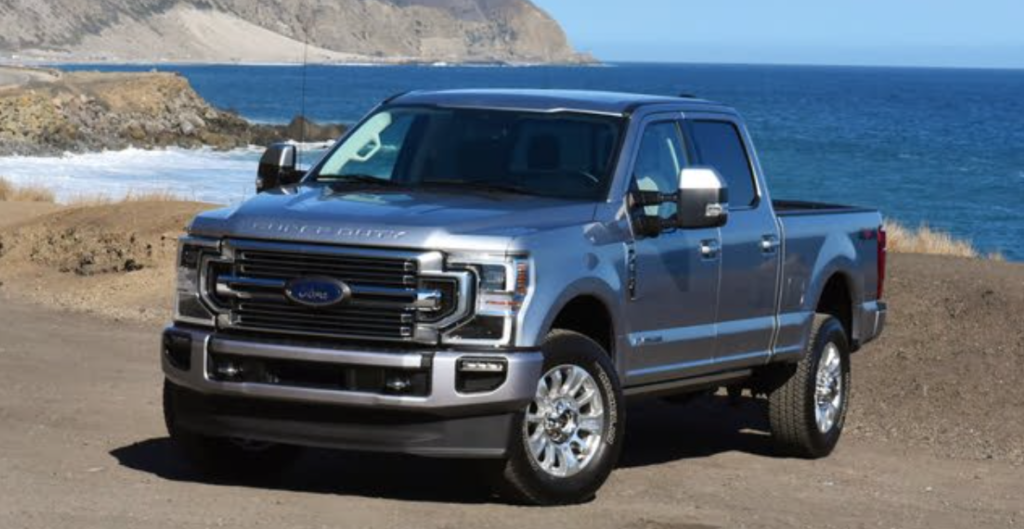Towing capacity, often an overlooked aspect of trucks for the casual observer, is a critical consideration for professionals, enthusiasts, and those with heavy lifting needs. Ford’s F350, a powerhouse in the trucking world, stands out for its commendable capabilities in this department.

The Importance of Tow Capacity in Trucks
In essence, tow capacity denotes the maximum weight a truck can tow without jeopardizing its safety or longevity. It’s a vital metric for industries such as construction, agriculture, and long-haul transport, where towing heavy machinery, trailers, or large loads is the norm. Knowing a truck’s tow capacity ensures safe, efficient, and economical transportation.
Overview of the Ford F350’s Reputation
The F350, part of Ford’s storied Super Duty lineup, has carved a niche for itself as a reliable heavy-duty truck. Synonymous with strength and durability, the F350 tow capacity has become a benchmark for many, illustrating the truck’s prowess in handling substantial weights with ease.
Historical Overview
Understanding the F350’s tow capacity requires a look back at its evolutionary journey, tracing back its roots and seeing how it stacks up against its competitors.
Evolution of F350’s Towing Capacities Over the Years
From its inception, the F350 was designed with robust capabilities in mind. In the early 2000s, the F350 tow capacity hovered around 13,000 lbs, depending on the configuration. Fast forward to recent models, advancements in technology, and design have pushed that number north of 35,000 lbs, showcasing the incredible leaps Ford has made in enhancing the truck’s capabilities.
Comparing F350’s Tow Capacity with Competitors Through Time
Historically, the F350 has always been in a tight race with its chief rivals like the Chevrolet Silverado 3500HD and the RAM 3500. While there have been years where competitors momentarily surpassed the F350 tow capacity, Ford’s commitment to innovation has ensured the F350 frequently stays ahead or at par in this towing tug-of-war.
What Determines Tow Capacity?
A truck’s towing capacity isn’t just about size; it’s a complex interplay of various components working in harmony.
Anatomy of a Truck’s Towing Strength
Several factors dictate how much a truck can tow. The chassis strength, brake system efficiency, suspension design, and axle strength all come together to determine this capability. An integrated system, each element complements the other, ensuring the F350 tow capacity remains consistent and reliable.
The Role of Engine Power and Type
Engines play a pivotal role. The sheer force required to pull heavy loads necessitates a powerful engine. Over the years, the F350 has seen various engine types, from V8s to turbo-diesels. For instance, the acclaimed Power Stroke V8 Turbo Diesel, renowned for its immense torque, significantly boosts the F350 tow capacity.
Significance of Transmission and Drivetrain
An engine’s power is of little use if it isn’t transferred efficiently to the wheels. The transmission, whether manual or automatic, needs to manage this power delivery smoothly, ensuring optimal force distribution. The drivetrain, on the other hand, must be rugged enough to handle the stress, especially when nearing the upper limits of the F350 tow capacity.
The F350’s towing capacity is a testament to Ford’s engineering prowess, reflecting decades of innovation and refinement. Whether you’re towing a boat, a horse trailer, or heavy machinery, understanding and appreciating the intricacies behind the F350 tow capacity ensures both a safe and efficient experience.
Differentiating Tow Capacities: F350 Models
When it comes to towing power, not all trucks are made the same. Ford’s F350 has been a standard bearer in the heavy-duty truck sector for a reason. Its combination of power, reliability, and flexibility has made it a favorite for both casual users and professionals. But what exactly determines the f350 tow capacity? How do various configurations and factors play into how much weight it can safely haul? Let’s break it down.
Gasoline vs. Diesel
One of the first choices an F350 buyer will encounter is whether to opt for a gasoline or diesel engine. Both have their advantages, but when it comes to the f350 tow capacity, there are some clear differences.
- Gasoline Engines: Typically, gasoline engines offer more horsepower, which means quick acceleration and an ability to maintain speeds, especially on inclines. However, the tow capacity of a gasoline F350 might be slightly less than its diesel counterpart.
- Diesel Engines: Diesel engines are renowned for their torque. This torque provides the pulling power needed to tow heavy loads. Hence, F350 models with diesel engines tend to have a higher tow capacity. Additionally, diesels are more fuel-efficient when under heavy loads, making them ideal for long hauls.
Single Rear Wheel (SRW) vs. Dual Rear Wheel (DRW)
Another critical determinant of the f350 tow capacity is whether the truck has a Single Rear Wheel (SRW) or a Dual Rear Wheel (DRW) setup.
- Single Rear Wheel (SRW): As the name suggests, SRW models have one wheel on each side in the back. This setup offers better fuel efficiency and is easier to maneuver, especially in cities or tight spaces. However, its tow capacity is generally lower than DRW models because of the reduced stability with heavy loads.
- Dual Rear Wheel (DRW): DRW models, often called “duallies,” have two wheels on each side in the rear. This configuration offers increased stability, especially for large trailers, translating to a higher f350 tow capacity. The trade-off is reduced fuel efficiency and a wider turning radius.

Factors Influencing the F350’s Tow Capacity
When evaluating the f350 tow capacity, understanding the associated ratings and factors is essential.
Gross Vehicle Weight Rating (GVWR)
GVWR is the maximum allowable weight of the truck, including its own weight plus the weight of its passengers, cargo, and any additional equipment. Exceeding the GVWR can lead to reduced performance, increased wear and tear, and potential safety hazards.
Gross Combined Weight Rating (GCWR)
GCWR takes into account both the weight of the F350 and the weight of the trailer it’s towing. This rating is crucial to know when determining the f350 tow capacity, as it provides the upper limit for safe and efficient operation.
Payload Capacity and Its Impact on Towing
Payload capacity refers to the maximum weight you can load onto the truck itself (including passengers). As this weight increases, the tow capacity might decrease, because the vehicle has to carry its own load in addition to pulling a trailer.
Hitch Types and Their Role in Towing
The type of hitch you use can influence the f350 tow capacity. There are several types, including receiver hitches, fifth-wheel hitches, and gooseneck hitches. Each has its own weight limits and applications, with fifth-wheel and gooseneck hitches typically allowing for heavier loads.
Practical Implications of F350 Tow Capacity
Understanding the f350 tow capacity isn’t just academic. There are real-world applications and considerations.
Ideal Scenarios for Maximum Towing
Using an F350 to its maximum tow capacity is ideal for scenarios like hauling large trailers, RVs, boats, or heavy machinery. Professionals in construction, agriculture, and transportation can particularly benefit.
Importance of Weight Distribution
Even if you’re within the f350 tow capacity, improper weight distribution on a trailer can cause issues. Balanced loads ensure stability, reducing risks like trailer sway.
Safety Considerations When Nearing Max Capacity
When nearing the f350 tow capacity, always account for safety. Ensure the vehicle’s brakes, tires, and suspension are in top condition. Furthermore, always account for additional factors like wind resistance, road conditions, and elevation changes, which can affect towing performance.
The F350’s tow capacity is influenced by various factors, from engine type to hitch selection. Making informed decisions based on these can ensure efficiency, safety, and longevity in any towing scenario.
Accessorizing for Optimal Towing
The power and performance of the F350 are undeniably impressive. But when pushing the boundaries of the f350 tow capacity, every detail matters. From visual aids to braking assistance, several accessories can enhance the towing experience, ensuring both efficiency and safety.
Towing Mirrors and Their Importance
While they may seem like a minor detail, towing mirrors play a pivotal role when you’re harnessing the f350 tow capacity to its fullest. Regular side mirrors may not provide the visibility required when towing larger trailers.
- Why are they essential? Towing mirrors extend further than regular mirrors, allowing the driver to have a clearer view of the entire length of the trailer. This is crucial for lane changes, reversing, and general situational awareness on the road.
- Safety Implications: A clear view can mean the difference between a safe trip and an accident. Towing mirrors reduce blind spots, making maneuvers more predictable and ensuring the safety of other road users.
The Role of Brake Controllers
Braking is fundamentally different when towing. The additional weight means more momentum, and thus, longer stopping distances.
- What are brake controllers? These are devices that manage the electric brakes on the trailer, allowing for synchronized braking between the F350 and the attached trailer.
- Enhancing the f350 tow capacity: With a brake controller, the truck and trailer work in tandem, leading to smoother stops, reduced wear on the brakes, and enhanced safety. In essence, a brake controller lets you leverage the f350 tow capacity with confidence.
Suspension Upgrades for Enhanced Towing
Even a powerhouse like the F350 can benefit from a suspension upgrade when frequently operating at its maximum tow capacity.
- Benefits: Upgraded suspensions provide more stability, especially with uneven loads. They also ensure the truck remains level, preventing the front from lifting, which can affect steering responsiveness.
- Enhancing the f350 tow capacity: A stable ride means more control, especially at higher speeds or in challenging terrains. An upgraded suspension can thus make the most of the f350 tow capacity, ensuring loads are towed safely and efficiently.
Comparing F350’s Tow Capacity with Contemporary Trucks
F350 vs. Other Heavy-duty Ford Trucks
The Ford lineup boasts several heavy-duty trucks, each with its own specialties. While the F350 is renowned for its balance of power and flexibility, trucks like the F250 and F450 have their own merits.
- F350 vs. F250: The F250 is slightly smaller, and as such, has a slightly lower tow capacity. However, it might offer better fuel efficiency. The f350 tow capacity, however, stands out when heavy-duty towing is a frequent requirement.
- F350 vs. F450: The F450 is a beast, designed for the most challenging tasks. While its tow capacity surpasses the F350, it might be overkill for users who don’t need such extensive capabilities.
F350’s Position Among Major Competitors
In the broader market, the f350 tow capacity holds its own against major competitors. Brands like Chevrolet, GMC, and Ram have their offerings, but the F350 strikes a balance between raw power and user-friendly features.

Real-World Experiences
Case Studies of F350 Towing in Various Conditions
- Mountain Towing: One case study reveals an F350 successfully towing a 12,000-pound trailer up a mountainous terrain, highlighting the truck’s exceptional torque and engine power.
- Cross-country Haul: Another instance shows the F350 hauling a large RV across the country, emphasizing the vehicle’s reliability and fuel efficiency when utilizing its full tow capacity.
Testimonials from F350 Owners
- John from Texas: “I’ve used various trucks over the years, but the f350 tow capacity genuinely stands out. It handles my boat with ease, even on longer trips.”
- Sarah from Colorado: “As a professional horse transporter, I rely heavily on my F350. The power, combined with the safety features, gives me peace of mind on every journey.”
The F350, with its impressive tow capacity, is more than just numbers on paper. Real-world applications, coupled with the right accessories, make it a formidable player in the world of heavy-duty trucks. Whether comparing within the Ford lineup or against major competitors, the F350 often emerges as a preferred choice for those in the know.
Conclusion
The versatility and strength of Ford’s F350 are indisputable, making it one of the front-runners in the realm of heavy-duty trucks. The f350 tow capacity is a testimony to Ford’s dedication to innovation and quality. But, to truly appreciate its prowess, let’s take a moment to review and look forward to what lies ahead.
Recap of the F350’s Towing Capabilities
The f350 tow capacity, in its many variations, is a blend of meticulous engineering and user-centric design. Whether it’s the distinction between gasoline and diesel engines, the stability provided by DRW over SRW, or the influence of GVWR and GCWR, the F350 showcases an exceptional balance between raw power and safety. With the right accessories, like towing mirrors, brake controllers, and suspension upgrades, one can harness this power efficiently and responsibly.
Prospective Outlook for Future Models
The automotive world is continually evolving, and so is the F350. Future models promise enhancements in the f350 tow capacity, with advancements in engine technology, aerodynamics, and safety features. As sustainability becomes a pivotal concern, we might also witness hybrid or electric variations that don’t compromise on towing capabilities.
FAQs
Navigating the intricacies of the f350 tow capacity can lead to a plethora of questions. Let’s address some of the most commonly asked ones.
How do I know the specific tow capacity of my F350 variant?
Answer: The best way to determine the precise f350 tow capacity for your variant is by referring to the owner’s manual. Additionally, Ford’s official website and authorized dealerships provide such specifics based on model, year, and configuration.
Are there legal restrictions on how much I can tow?
Answer: Yes, legal towing limits can vary by state or country. It’s crucial to familiarize yourself with local regulations. Even if your F350 has a higher tow capacity, legal limits may restrict you from utilizing its full potential on public roads.
How can I enhance my F350’s towing capacity safely?
Answer: While the f350 tow capacity is already impressive, safe enhancements can include upgrading the braking system, investing in a higher-quality hitch, or improving the suspension. Always consult with professionals before making any modifications.
What are common signs of exceeding tow capacity?
Answer: Symptoms can include difficulty in steering, persistent swaying of the trailer, excessive strain on the engine (evident from temperature spikes), prolonged braking distances, and unusual noises. Regularly exceeding the f350 tow capacity can jeopardize safety and vehicle health.
Does regularly towing at max capacity impact the longevity of the F350?
Answer: While the F350 is designed to handle its stated tow capacity, consistently operating at its limit can accelerate wear and tear on the engine, transmission, brakes, and suspension. Regular maintenance and checks become even more critical under such conditions to ensure the longevity of the vehicle.
In essence, the f350 tow capacity embodies Ford’s commitment to performance and reliability. It serves as a reminder that with the right knowledge and accessories, one can achieve feats of strength while maintaining safety and efficiency. Future models of the F350 beckon with the promise of even greater capabilities, ensuring its continued legacy in the world of towing.